Trump will call Putin to push for trilateral with Zelenskyy
Published in News & Features
WASHINGTON — U.S. President Donald Trump and Ukrainian leader Volodymyr Zelenskyy expressed optimism their summit with European leaders could result in trilateral talks with Russian leader Vladimir Putin over ending the Russian leader’s war in Ukraine.
The White House meeting came days after the U.S. president met Putin in Alaska. But while that gathering — which saw Trump say the onus was on Zelenskyy to end the three-year-long conflict — sparked concern among allies, Monday’s meeting provided Ukraine reason for hope.
Zelenskyy said he was encouraged that the U.S. would participate in security guarantees as part of any peace deal, and signaled that Trump had agreed to a key ask: that discussion of territorial exchanges be reserved for direct talks with Putin. Trump signaled that he may be able to convince Russia to release as many as a thousand prisoners as a show of good faith.
More broadly, the two leaders — who have often struggled to work harmoniously since Trump’s return to power — spent the afternoon praising each other and underscoring the unity between Kyiv and Washington.
“If everything works out well today, we’ll have a trilat,” Trump told reporters during his Oval Office meeting with Zelenskyy. “We’re going to work with everybody, and we’re going to make sure that if there’s peace the peace is going to stay long term.”
Trump said he planned to hold a phone call with Putin following the talks, which also included German Chancellor Friedrich Merz, French President Emmanuel Macron, UK Prime Minister Keir Starmer, Italian Prime Minister Giorgia Meloni and European Commission President Ursula von der Leyen. Also attending were individuals Trump has struck a personal rapport with, including NATO Secretary General Mark Rutte and Finnish President Alexander Stubb.
That could shift pressure back onto the Kremlin, which so far has resisted scheduling a meeting between Putin and Zelenskyy while protesting expanded security guarantees for Ukraine that the Russian leader has depicted as a national security threat.
But Trump on Monday said he had convinced Putin that such a program — led by Europe — would be necessary for a peace deal.
“President Putin agreed that Russia would accept security guarantees for Ukraine. And this is one of the key points that we need to consider, and we’re going to be considering that at the table,” Trump said as he opened the meeting with European counterparts. “I’m optimistic that collectively, we can reach an agreement that would deter any future aggression against Ukraine, and I actually think there won’t be.”
Trump added that “the European nations are going to take a lot of the burden and the U.S. would “help them and we’re going to make it very secure.”
The tone between Trump and Zelenskyy was notably improved from the Ukrainian president’s last visit to Washington in February, which erupted into a bitter public clash with Trump and briefly led to the U.S. halting military support. Zelenskyy repeatedly thanked Trump, following criticism from U.S. Vice President JD Vance six months ago that he was insufficiently grateful for American military and financial aid.
Zelenskyy cast his direct talks with Trump as a “very good conversation” and the “best one” so far and indicated that he discussions about territory might take place if he meets with Putin.
“What is very important that all the sensitive things, territorial, et cetera,” Zelenskyy said. “We will discuss on the level of leaders during trilateral meeting.”
“We will speak more about security guarantees, this is very important that United States gives such a strong signal,” he added.
This time, Zelenskyy arrived at the White House donning a jacket after Trump allies criticized the war fatigues he wore to his last sit-down with the U.S. president.
“It’s the best I have,” Zelenskyy said, referring to his outfit, to which Trump replied, “I love it.”
Show of force
European leaders are determined not to leave a positive outcome to chance. They arrived at the White House in a show of diplomatic force behind Ukraine, determined to secure its territorial integrity and obtain ironclad security assurances from Washington.
Starmer, at the beginning of the broader meeting, said that if the group could ensure progress on “security guarantees” and a “trilateral meeting of some sort to bring some of the difficult issues to a head, then I think today will be seen as a very important day.”
Trump has accelerated his push to secure a quick deal to stop Russia’s invasion that has persisted despite months of U.S. diplomatic efforts and his campaign-trail vow to end it on his first day in office.
On Monday, he said he remained convinced that a “deal was within reach,” that Putin was genuine about seeking peace, and that the leaders would “come to a resolution today, I think, on almost everything.” Trump predicted that the world would know within a week or two “whether or not we’re going to solve this or is this horrible fighting going to continue.”
Despite the stakes, the leaders seemed largely jovial. Trump praised the Europeans for their summertime tans, chatted about golf, and was caught on a hot mic polling the group on if they wanted to take questions from the media.
But even among the bonhomie, the risks for Ukraine have grown even more intense. Trump after meeting Putin backed off his threat of more sanctions on Moscow and dropped demands for a ceasefire as a condition for further talks, aligning himself with the Kremlin’s position that negotiations with Ukraine should focus on a long-term settlement.
The U.S. president Monday reiterated his claim that Zelenskyy could end the war, raising the prospect of Kyiv being forced into making unpalatable territorial concessions.
“I don’t think you need a ceasefire,” Trump said Monday, in response to a question. “We can work a deal where we’re working on a peace deal while they’re fighting.”
Zelenskyy said Ukraine would need “everything” from the U.S. and its allies — including weapons and security guarantees — to be able to strike a deal. He cited a program to provide Patriot air defense batteries — paid for by European allies — to the country as Russia ramps up missile and drone attacks, offering his thanks to Trump.
“We are thankful for this program and this opportunity,” he said.
Tense negotiations
The mood going into the meeting has been tense following Trump’s summit with Putin, whose full-scale invasion of Ukraine has left Europe facing its deadliest conflict in decades.
In his calls with European leaders after the Alaska summit, Trump said Putin wants Ukraine to cede control of its entire Donbas region of the Donetsk and Luhansk provinces, renewing earlier demands. That would hand Russia a victory it has been unable to achieve militarily since fighting first erupted in 2014, and in an area where Ukraine retains heavily-fortified defenses.
Russia would also halt advancing its claims over the parts of Ukraine’s Zaporizhzhia and Kherson regions that it doesn’t now control, effectively freezing the battle lines at current positions. The Kremlin could also potentially withdraw troops from areas of northeastern Ukraine near the Russian border where its forces control only small pockets of land.
That raises the prospect that the “land-swapping” Trump has teased as part of any deal will be lopsided in Putin’s favor by giving him control of areas beyond what he’s seized, offset by modest concessions of land that had been Ukraine’s anyhow.
Russia, meanwhile, has continued to make slow but steady advances in eastern Ukraine. Hours after Zelenskyy arrived in Washington, Russian attacks on the Ukrainian cities of Kharkiv and Zaporizhzhia killed at least 10 civilians, including two children, and injured dozens, according to local authorities.
_____
(With assistance from Piotr Skolimowski.)
_____
©2025 Bloomberg L.P. Visit bloomberg.com. Distributed by Tribune Content Agency, LLC.
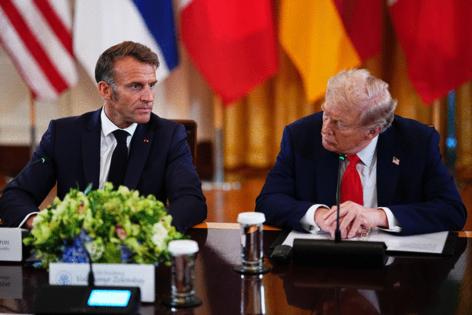
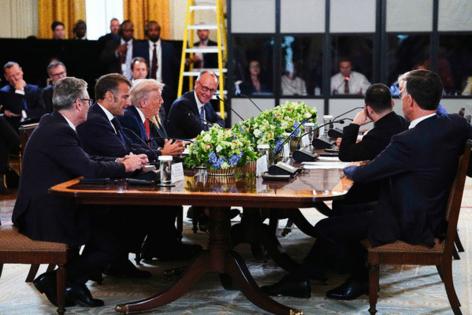
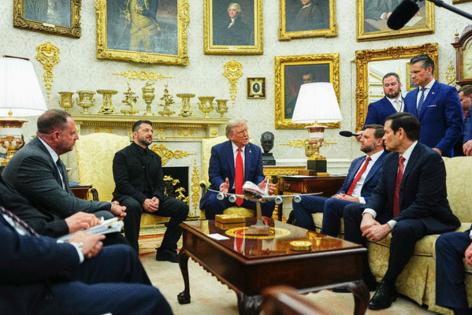
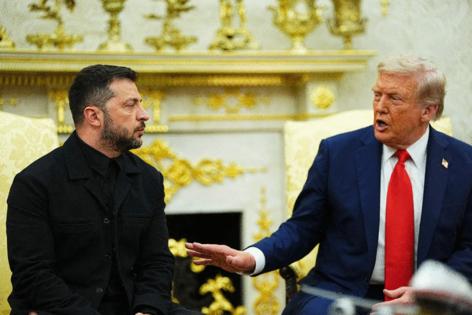
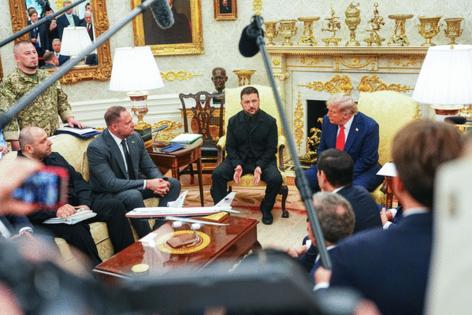











Comments